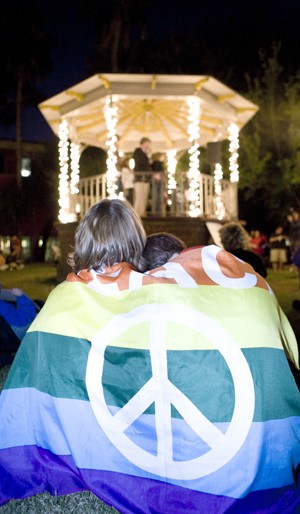The fact that (marriage) is only between a man and a woman, does that mean we are just for reproducing human beings or is marriage about caring about someone and committing to them in a partnership for your life? … Aside from man and woman, man and man or woman and woman, why do people get married?””
Creative writing senior Brooke Willock recently pondered the implications of Proposition 102, the “”Yes for Marriage”” proposition that amended the Arizona State Constitution when it was passed in the Nov. 4 election.
“”This is not something that we can wait for,”” Willock said. “”We do not have time for this sort of oppression to die out.””
Ads for the proposition showed heterosexual parents cooing over engagement rings and their daughters’ first dates, panoramic views of big churches and enormous family portraits. The amendment officially classifies marriage as a union between a man and a woman, excluding unions between gay and lesbian couples.
“”I believe marriage is a sacred bond between one man and one woman,”” architecture sophomore Bryan Duff said, adding that, “”A kid needs a father figure and a mother figure. It makes sense for the father figure to be a man, the mother figure to be a woman. But at the end of the day, I think it’s OK for chicks to get with chicks and dudes to get with dudes, as long as they don’t get married.””
The proposition’s passing lit a fire in the Tucson community, sparking a protest on Friday.
Everyone gathered was abuzz with nervous energy. Elaborate signs hovered above the crowd like irate thought bubbles. Various protests included, “”We want to be miserable too,”” and “”Marriage is a human right, not a heterosexual privilege.”” When the march from El Presidio to La Placita began, the crowd chanted in unison “”Gay, straight, black, white, we all deserve equal rights!””
The rally’s attendees were visibly disappointed with Proposition 102’s success, but the rally also seemed to be incentive to push for equal rights in every aspect of humanity.
“”It is, for me, a concrete reminder that we still don’t have liberty and justice for all in this country,”” women’s studies professor Arianne Burford said.
Other attendees saw the election result in a positive light, even if they disagreed with the outcome.
“”We want to celebrate that we’re (Pima County) a shining light in progress and hope, the only county to defeat Prop. 102,”” said Jason Cianciotto, a UA alumnus and executive director of Wingspan, Southern Arizona’s lesbian, gay, bisexual and transgender community center.
Cianciotto criticized Proposition 102 supporters for thinking they are protecting marriage, saying they “”are letting faith get in the way of humanity.””
Rev. Ron Rude of the Lutheran Campus Ministry, however, disagreed with those who feel the issue behind Proposition 102 was about protecting religious views.
“”It was a harmful proposition,”” Rude said. “”The Lutheran Church has been trying to find ways to be inclusive and to show dignity to those who culture tends to marginalize. We should push for basic civil rights for all.””
Across campus, the vast majority of students surveyed for this article agreed with Willock about Proposition 102.
“”I’m not a fan,”” psychology junior Ishan Mankad said. “”They can’t do what they want to do, that is un-American.””
Burford, who calls herself “”queer,”” saw the proposition’s passing as a matter of oppression. (Many in the LGBTQ community have re-appropriated the term queer to show that someone’s sexual orientation does not conform to heteronormative society.)
“”The passing of this proposition tells us that the majority of Arizonans see us as inferior, as less than human, as if we don’t deserve the dignity to love who we want and that our love counts as less,”” Burford said. “”The state should not dictate who should have these privileges and who should not.””
She also noted problems with marriage that were not discussed in the cheerful “”Yes on 102″” ads this year.
“”By the law, it is legal for a man and woman to be in a relationship in which the woman is a victim of domestic violence, but it is not legal for a woman to be in a relationship with a woman who she is very much in love with and be married to that person,”” Burford said. “”That is very profoundly disturbing to me.””
But for Bomyung Kim, a women’s studies graduate student, it comes down to defining the modern family in a traditional light.
“”It is kind of impossible to define what a family is, because it is so diverse and the culture is changing so fast,”” Kim said. “”Why do you want to define it by law?””
No matter their opinions, campus community members and Tucsonans alike have found reasons to protest, debate and exercise their freedom of speech to discuss the implications of Proposition 102.
And even with the constitution already amended, the discussion doesn’t appear to be over yet.









